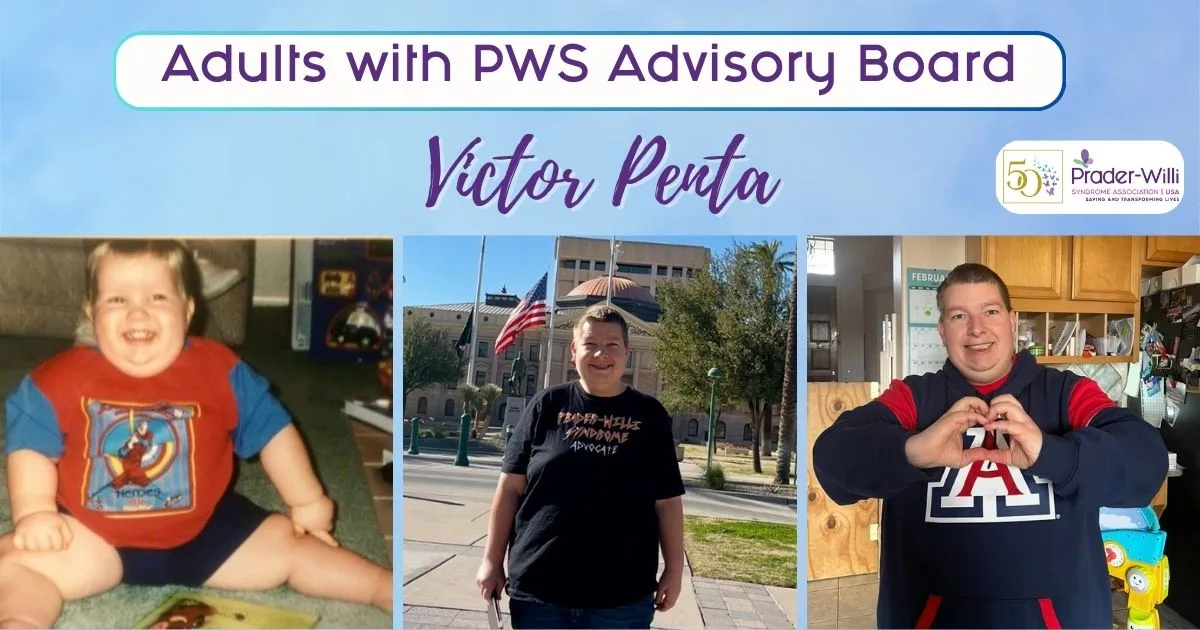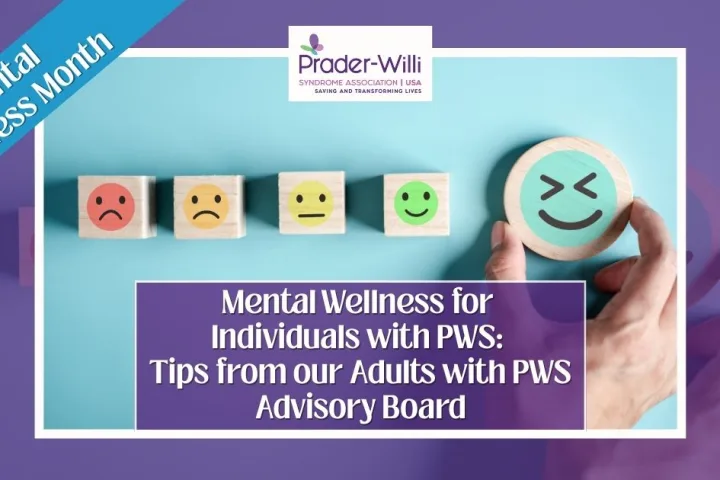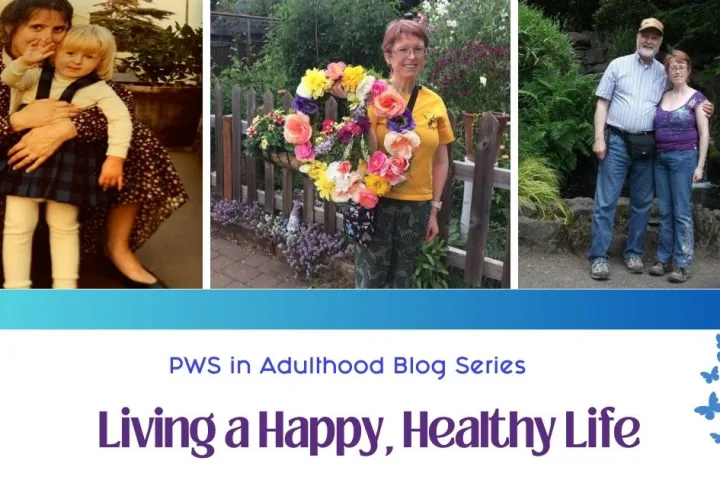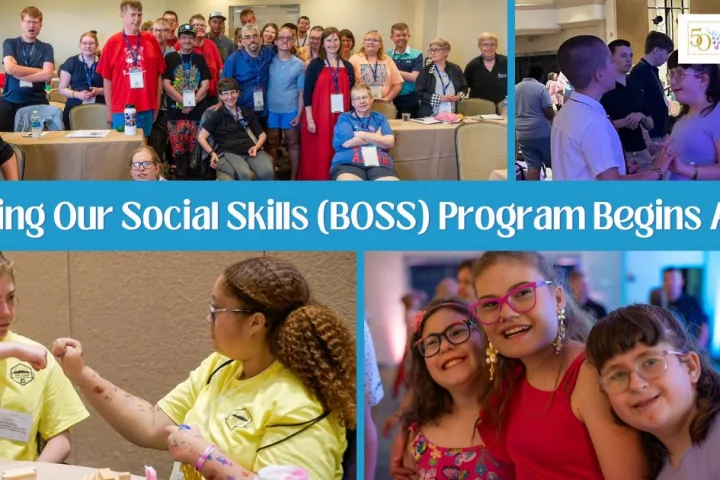Victor Penta is 31 years old and lives with Prader-Willi syndrome. He resides in Arizona and has been on the Adults with PWS Advisory Board since 2019. In an effort to learn more about our adults with PWS, and to shine a light on their lives and experiences, we asked our Advisory Board members some questions. Below are Victor’s responses.
What is something you are really good at?
I am really good at public speaking and advocating for PWS at our state capitol and in Washington DC. I am also good at being an Uncle to my niece and nephew and I am good at drawing.
What are some activities you like to do?
I like to play basketball, softball, volleyball and bowling with Special Olympics. I like to watch the UA basketball team play each season and I like to be a mentor with Young Life Capernaum, which is a club for other people with developmental disabilities.
What makes you happy? What makes you laugh or smile?
Being an Uncle makes me really happy. I can make my niece smile and my nephew laugh at me being silly. It also makes me happy to spend time with my friends.
What is something that makes you interesting?
I know all the players on the UA Men’s basketball team. I am a very caring person.
Why should people learn about PWS?
People should learn about PWS because it is a life-threatening syndrome and for them to understand my challenges. My friends and I with PWS are a lot alike, but we are also very different. It helps when people understand hyperphagia and behaviors because they are embarrassing.
What is one thing people should know about PWS?
It sucks and my brain makes me think I’m hungry all the time.
Is there something about PWS that people don’t understand?
That just because we have PWS, we are all different and we just want to be normal, like everyone else.
In what way does PWS challenge you?
As an adult, I have daily restrictions. I don’t have independence like my siblings.
How does PWS make you special?
Because I struggle with PWS, it makes me understand others who have other disabilities and their struggles. It makes me more caring for other people.
Is there something you would say to parents of newly diagnosed individuals with PWS?
I would tell the new parent it will be ok. That their child will grow up and have a good quality of life. That they will have friends and activities and be happy. That they will enjoy their time with their family.
To learn more about the Adults with PWS Advisory Board, please read our blog Adults with PWS Advisory Board Gathers in Phoenix: Shaping the Future of Support, Advocacy for Individuals Living with PWS – Prader-Willi Syndrome Association | USA
Share this!





 Perry A. Zirkel has written more than 1,500 publications on various aspects of school law, with an emphasis on legal issues in special education. He writes a regular column for NAESP’s Principal magazine and NASP’s Communiqué newsletter, and he did so previously for Phi Delta Kappan and Teaching Exceptional Children.
Perry A. Zirkel has written more than 1,500 publications on various aspects of school law, with an emphasis on legal issues in special education. He writes a regular column for NAESP’s Principal magazine and NASP’s Communiqué newsletter, and he did so previously for Phi Delta Kappan and Teaching Exceptional Children. Jennifer Bolander has been serving as a Special Education Specialist for PWSA (USA) since October of 2015. She is a graduate of John Carroll University and lives in Ohio with her husband Brad and daughters Kate (17), and Sophia (13) who was born with PWS.
Jennifer Bolander has been serving as a Special Education Specialist for PWSA (USA) since October of 2015. She is a graduate of John Carroll University and lives in Ohio with her husband Brad and daughters Kate (17), and Sophia (13) who was born with PWS. Dr. Amy McTighe is the PWS Program Manager and Inpatient Teacher at the Center for Prader-Willi Syndrome at the Children’s Institute of Pittsburgh. She graduated from Duquesne University receiving her Bachelor’s and Master’s degree in Education with a focus on elementary education, special education, and language arts.
Dr. Amy McTighe is the PWS Program Manager and Inpatient Teacher at the Center for Prader-Willi Syndrome at the Children’s Institute of Pittsburgh. She graduated from Duquesne University receiving her Bachelor’s and Master’s degree in Education with a focus on elementary education, special education, and language arts. Evan has worked with the Prader-Willi Syndrome Association (USA) since 2007 primarily as a Crisis Intervention and Family Support Counselor. Evans works with parents and schools to foster strong collaborative relationships and appropriate educational environments for students with PWS.
Evan has worked with the Prader-Willi Syndrome Association (USA) since 2007 primarily as a Crisis Intervention and Family Support Counselor. Evans works with parents and schools to foster strong collaborative relationships and appropriate educational environments for students with PWS. Staci Zimmerman works for Prader-Willi Syndrome Association of Colorado as an Individualized Education Program (IEP) consultant. Staci collaborates with the PWS multi-disciplinary clinic at the Children’s Hospital in Denver supporting families and school districts around the United States with their child’s Individual Educational Plan.
Staci Zimmerman works for Prader-Willi Syndrome Association of Colorado as an Individualized Education Program (IEP) consultant. Staci collaborates with the PWS multi-disciplinary clinic at the Children’s Hospital in Denver supporting families and school districts around the United States with their child’s Individual Educational Plan. Founded in 2001, SDLC is a non-profit legal services organization dedicated to protecting and advancing the legal rights of people with disabilities throughout the South. It partners with the Southern Poverty Law Center, Protection and Advocacy (P&A) programs, Legal Services Corporations (LSC) and disability organizations on major, systemic disability rights issues involving the Individuals with Disabilities Education Act (IDEA), Americans with Disabilities Act (ADA), and the federal Medicaid Act. Recently in November 2014, Jim retired.
Founded in 2001, SDLC is a non-profit legal services organization dedicated to protecting and advancing the legal rights of people with disabilities throughout the South. It partners with the Southern Poverty Law Center, Protection and Advocacy (P&A) programs, Legal Services Corporations (LSC) and disability organizations on major, systemic disability rights issues involving the Individuals with Disabilities Education Act (IDEA), Americans with Disabilities Act (ADA), and the federal Medicaid Act. Recently in November 2014, Jim retired.